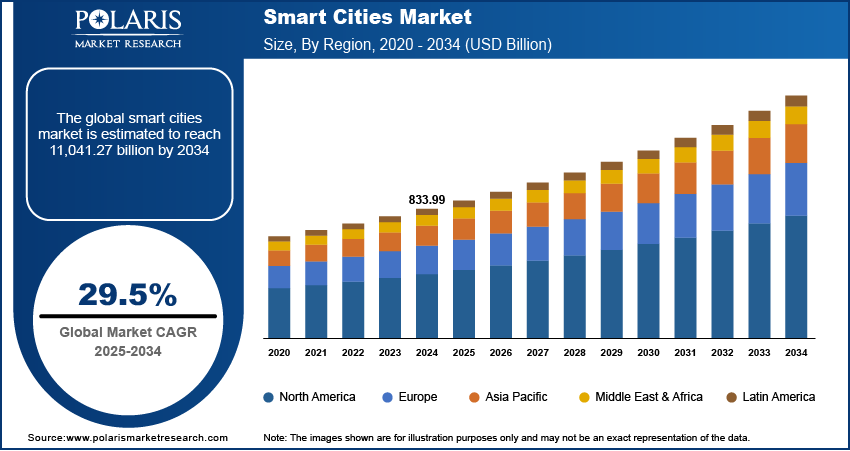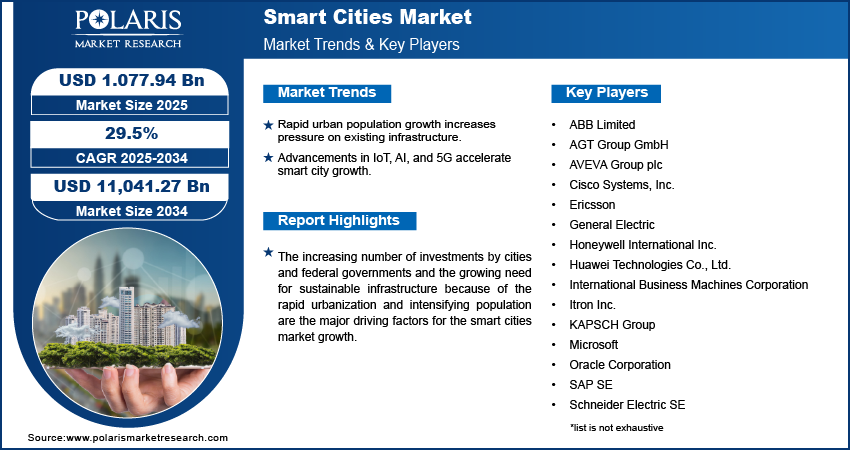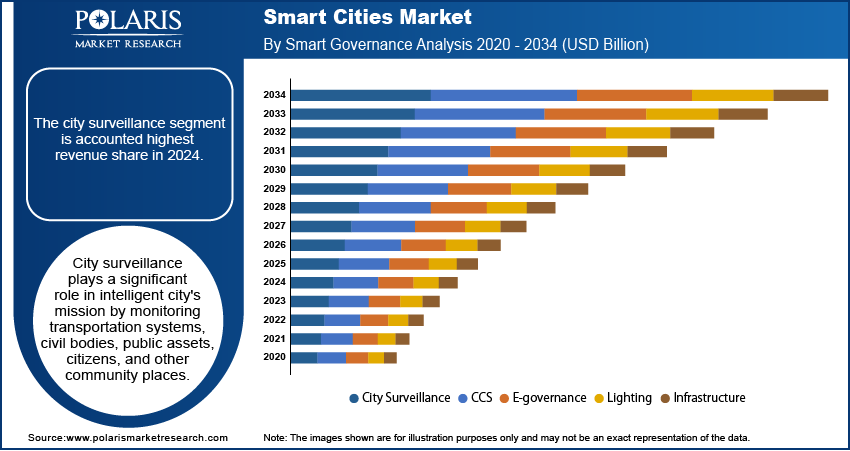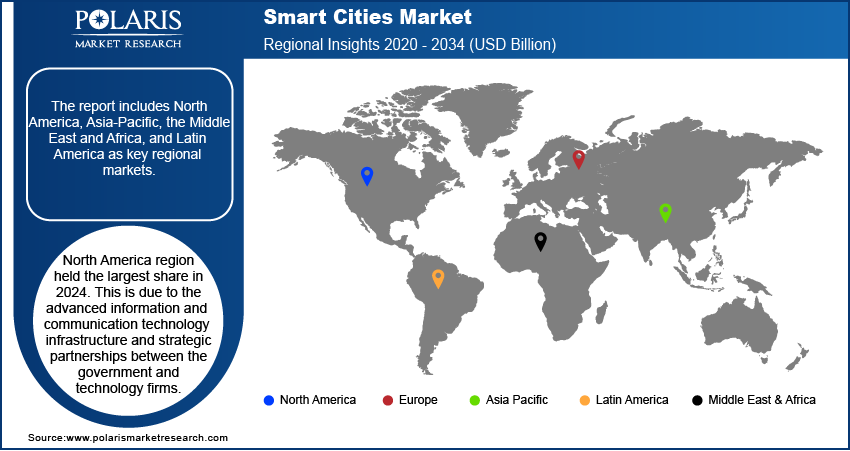
Smart Cities Market Share, Size, Trends, Industry Analysis Report
By Application, By Smart Governance, By Smart Utilities, By Smart Transportation, By Regions; Segment Forecast, 2025- 2034
- Published Date:Sep-2025
- Pages: 110
- Format: PDF
- Report ID: PM1989
- Base Year: 2024
- Historical Data: 2020 - 2023
The global smart cities market was valued at USD 833.99 billion in 2024 and is expected to grow at a CAGR of 29.5% during the forecast period. The increasing number of investments by cities and federal governments and the growing need for sustainable infrastructure because of the rapid urbanization and intensifying population are the major driving factors for the smart cities market growth.
Key Insights
- By application, the smart utilities segment held the largest share in 2024. This is because of the increased demand for energy and the increasing need to effectively manage resources.
- By smart governance, city surveillance systems held the largest share in 2024. This is attributable to the heightened international emphasis on city safety.
- By smart utilities, the energy management systems held the largest share in 2024. This is because of the increasing global energy needs and the application of advanced technologies like AI to develop optimized power networks.
- By smart transportation, the Intelligent Transport Systems (ITS) held the largest share in 2024. This is driven by the need to address traffic-related issues and increasing concern for road safety.
- By region, the North America region held the largest share in 2024. This is due to the advanced information and communication technology infrastructure and strategic partnerships between the government and technology firms.
Industry Dynamics
- Rapid growth in urban populations is putting pressure on existing infrastructure, making it one of the drivers.
- The rapid technological advancements, for example, the Internet of Things (IOT), Artificial Intelligence, and 5G technology, are all factors for the growth of smart cities.
- The government also encourages sustainability, which in turn pushes for the development of smart cities. These initiatives promote the advancement of smart technology, renewable energy, and other green technologies, which help cities achieve climate change objectives and improve the living standards of the citizens.
Market Statistics
- 2024 Market Size: USD 833.99 billion
- 2034 Projected Market Size: USD 11,041.27 billion
- CAGR (2025-2034): 29.5%
- North America: Largest market in 2024

To Understand More About this Research: Request a Free Sample Report
AI Impact on the Market
- AI is positively impacting the smart mobility of urban cities. With the use of traffic cameras and different sensors, AI technologies see real-time data and change traffic lights smartly, and even recommend alternative routes.
- The Framework of AI also increases the overall sustainability of urban cities. With the use of smart grids, AI technologies can accurately forecast energy consumption and waste, ultimately balancing supply and demand.
- Use of AI systems in urban planning and public safety fields is proving to be equally valuable. AI systems help analyze data to geolocate possible crime events and help position the police in advance.
Moreover, rising demand for public safety & security are fulfilling with the help of technologically advanced devices such as video surveillance cameras, immediate recognition of faces, and license plates may lead to the smart cities market growth. Furthermore, the emergence of the IoT and 5G technologies is also an impelling factor contributing towards the smart cities market development over the forecasting years.
The widespread COVID-19 witnesses a struggle to make progress from the outcome of the pandemic in various industries across the global economy, which curtailed several short-term intelligent cities plans. However, long-term situations still remain favorable for the intelligent cities development projects due to the growth of the IoT sector which will contribute to the intelligent cities market development.
Thereby, COVID-19 acts as a catalyzing factor for the various sectors by offering digitalized services such as e-trading, e-health applications, e-banking, etc., across the globe. The penetration of the solutions and services is raised by the lots of intelligent cities providers to manage projects in sectors like transportation, citizen services, construction, and utilities. Hence, these factors witness a positive impact of the COVID-19 in the market.
Industry Dynamics
Growth Drivers
The emergence of artificial intelligence (AI) into intelligent cities developments is one of the significant driving factors for the market. The deployment of AI in various applications such as video surveillance, incorporation with independent ride-share vehicles, parking & traffic management, etc., is growing across multiple sectors which will contribute to the market development.
For example, in any emergency medical situation, AI-based cameras facilitate getting the doctor's aid on time. Similarly, AI is also integrated into CCTV cameras for facial identification that further supports citizens' safety.
Moreover, the technology of facial recognition also allows in accessing private details of a resident at the time of emergency. Also, AI integration with the sensors implemented at traffic signals and parking lots assists in collecting helpful information for designing the intelligent cities proposal efficiently which in turn propels the market development.
Consequently, the growing applications of AI are creating a lucrative growth of the market across the globe. Furthermore, the increasing number of smart cities initiatives also accelerates the market demand for intelligent cities. For instance, in Singapore, the National Research Foundation is working on developing Virtual Singapore, in which a dynamic 3D cities model and mutual data platform are set up.
Technologies are incorporated into housing with the help of a framework that reflects on living, environment, planning, and buildings. For example, engineers examine wind flow, shaded regions, and solar dispersion for improved design and site for new buildings. By 2022, the government intends to deploy intelligent, energy-efficient lighting for every community road and install solar panels on the rooftop of nearly 6,000 buildings.

Report Segmentation
The market is primarily segmented on the basis of application, smart governance, smart utilities, smart transportation, and region.
|
By Application |
By Smart Governance |
By Smart Utilities |
By Smart Transportation |
By Region |
|
|
|
|
|
Know more about this report: request for sample pages
Insight by Application
The transportation segment accounted for the highest revenue share in 2024. The increasing number of traffic jamming issues globally due to the growing requirements for modernizing public transportation infrastructure and rapid urbanization fuels the segment growth which will fuel the growth of the intelligent cities market growth.
In addition, the penetration of IoT technologies across the transportation sector supports the professional management of traffic in cities. The rising intelligent cities market demand for electric vehicles, driverless cars, on-demand mobility, and ride-sharing is the additional key factors in the smart cities projects that contribute to the segment growth.

The governance segment is projected to show the fastest growth rate in the forthcoming years. It facilitates government associations to enhance transparency, responsibility, security, involvement of citizens and increases collaboration and making a healthy partnership of government-public.
Smart governance can focus on allowing and managing effective decision-making and planning with the help of communication and information technology. Like, governments are adopting video surveillance systems for identifying and preventing criminal activities and developing smart supremacy.
Insight by Smart Governance
The city surveillance segment is accounted highest revenue share in 2024. City surveillance plays a significant role in intelligent city's mission by monitoring transportation systems, civil bodies, public assets, citizens, and other community places. The increasing awareness regarding public security & safety encourages the adoption of IP cameras and video management systems, which in turn drives the segment growth.
Moreover, availability of cost-effective IP camera and technological developments in analytics and software are other significant factors contribute to the segment demand for managing community security across the globe.
The Command and Control Center segment is projected to show the highest CAGR in the foreseen years as the providers progressively increase their network and connections with distributors, partners, and resellers for coming into the impending market.
Besides, the intelligent cities market demand of the segment is expanding because CC centers monitors and access every smart cities system and application, which comprises Intelligent Traffic Management System (ITMS) & intelligent parking, city surveillance, energy & waste management solutions, and smart lighting. Therefore, the segment plays a crucial role in the intelligent cities projects for gathering and evaluating a large amount of information flowing from various systems and applications which in turn will drive the market growth.
Geographic Overview
Geographically, North America is leading the market with the largest revenue share in 2024 due to the frequent digital transformation across numerous sectors such as banking, telecom, and banking.
Additionally, factors such as the existence of the major market players, availability of the well-developed ICT infrastructure, local and federal government’s partnership with the ICT start-ups and dealers boost the intelligent cities market demand across North America.
Furthermore, the occurrence of numerous international councils is also leading the market growth. For example, the U.S. Department of Transportation and Smart Cities Council encourages the concept of smart cities in North America by arranging networking events.
The market in Asia Pacific is projected to show a significant CAGR in the forecasting years due to the rising focus on digital infrastructure development and growing urbanization. Also, the emerging direction of the regulatory bodies in the APAC region for decreasing air pollution and traffic congestion and the advancement of the parking management system is attributed to the intelligent cities market development in the near future.
Moreover, numerous organizations are majorly opting for cloud-based solutions due to their cost-effectiveness leads to the growth of applications like smart utilities, smart building, innovative governance, and intelligent transportation. Hence, increasing disposable income in the Asia Pacific fuels the market greet in the upcoming years.

Which country dominated the Asia Pacific smart cities market in 2024?
India dominated the revenue share in Asia Pacific market in 2024. In the country, Smart Cities Mission is one of the largest national programs, with tens of thousands of projects across 100 cities. Rising urbanization and industrialization and increasing population boost the requirement for smart and sustainable infrastructure across cities. The smart city mission focuses on key areas such as eco-friendly infrastructure development, governance, and social development to create smarter, more livable urban spaces. According to the Ministry of Housing & Urban Affairs, 7,380 projects out of 8,075 have been completed, with an investment of ₹147,704 crore (approx. USD 1.655 billion). The government and private entities are investing in smart city projects to accelerate the development. The following table consists of concise information on major smart-city programs with investment figures.
|
Projects |
Location |
Investments |
Years/as-of |
Type |
|
Smart Cities Mission (100 cities) |
Nationwide (100 cities) |
₹1.47 lakh crore (~USD 1.655 billion USD) |
As of December 18, 2024 |
Public (central, state, and city projects) |
|
Smart Cities Mission (100 cities) — Government Dashboard Update |
Nationwide |
₹1.64 lakh crore (~USD 1.85 billion) (revised dashboard figure) |
As of June 24, 2025 |
Public |
|
Palakkad Industrial Smart City (Industrial Smart City) |
Palakkad, Kerala |
₹28,602 crore (~USD $32.23 million) (estimated project investment) |
Project approval & announcements 2024–2025 |
Public / PPP (planned central & state funding + investor commitments) |
|
GIFT City (Gujarat International Finance Tech City) |
Gandhinagar, Gujarat |
Over ₹1.775 lakh crore (USD 20 billion) |
Ongoing (Site reports committed fund investment totals) |
Combination of large private and institutional investments, as well as public enabling infra |
|
Dholera Special Investment Region (Dholera SIR, part of DMIC) |
Dholera, Gujarat |
~₹21,000 crore (~USD 3 billion) (single investor – Tsingshan Group) |
Ongoing project announcements/investor declarations |
Public (land and enabling infra) and large private/FDI commitments |
Such rising investments in smart city projects boost infrastructure development, industrialization, and technological advancements in these projects. Thus, increasing investments are expected to propel industry expansion in the coming years.
Competitive Insight
Major players operating in the global market include ABB Limited, AGT Group GmbH, AVEVA Group plc, , Cisco Systems, Inc., Ericsson, General Electric, Honeywell International Inc., Huawei Technologies Co., Ltd., International Business Machines Corporation, Itron Inc., KAPSCH Group, Microsoft, Siemens AG,, Oracle Corporation., SAP SE, Schneider Electric SE, Siemens AG, Telensa, Verizon, and Vodafone Group plc.
Recent Development
- March 2025: Huawei and the Barcelona City Council unveiled a strategic partnership at MWC Barcelona 2025 to advance smart city initiatives across the city.
- February 2025: IBM announced a partnership with C40 Cities through its Sustainability Accelerator program to foster innovation in the smart cities domain.
- August 2023: NEC Corporation India, a prominent IT services provider in India, pitched a new smart city initiative to Tirupati Smart City Corporation Limited. As described in the plan, it would allow NEC Corporation India to set up a City Operations Center (COC) in Tirupati and carry out enforcement of ICT solutions around the whole city.
- December 2023: Microsoft and Qatari real estate developer Msheireb Properties (MP) underwent a Memorandum of Understanding (MoU) in order to develop a “Smart Experience,” a project focusing mainly on residents, retail customers, visitors, and different business clients in MP’s flagship development, Msheireb Downtown Doha (MDD). The project will entail the implementation of innovative solutions to improve the well-being of members of the MDD community.
Smart Cities Market Report Scope
|
Report Attributes |
Details |
|
Market size value in 2024 |
USD 833.99 billion |
| Market size value in 2025 | USD 1.077.94 billion |
|
Revenue forecast in 2034 |
USD 11,041.27 billion |
|
CAGR |
29.5% from 2025 - 2034 |
|
Base year |
2024 |
|
Historical data |
2020 - 2023 |
|
Forecast period |
2025 - 2034 |
|
Quantitative units |
Revenue in USD billion/trillion and CAGR from 2025 to 2034 |
|
Segments covered |
By Application, By Smart Governance, By Smart utilities, By Smart Transportation By Region |
|
Regional scope |
North America, Europe, Asia Pacific, Latin America, Middle East & Africa |
|
Key Companies |
ABB Limited, AGT Group GmbH, AVEVA Group plc, , Cisco Systems, Inc., Ericsson, General Electric, Honeywell International Inc., Huawei Technologies Co., Ltd., International Business Machines Corporation, Itron Inc., KAPSCH Group, Microsoft, Siemens AG,, Oracle Corporation., SAP SE, Schneider Electric SE, Siemens AG, Telensa, Verizon, and Vodafone Group plc. |
FAQ's
? The global market size was valued at USD 833.99 billion in 2024 and is projected to grow to USD 11,041.27 billion by 2034.
? The global market is projected to register a CAGR of 29.5% during the forecast period.
? North America dominated the share in 2024.
? A few key players include ABB Limited, AGT Group GmbH, AVEVA Group plc, , Cisco Systems, Inc., Ericsson, General Electric, Honeywell International Inc., Huawei Technologies Co., Ltd., International Business Machines Corporation, Itron Inc., KAPSCH Group, Microsoft, Siemens AG, Oracle Corporation., SAP SE, Schneider Electric SE, Siemens AG, Telensa, Verizon, and Vodafone Group plc.
? The city surveillance systems segment accounted for the largest share of the market in 2024.
? The Intelligent Transport Systems (ITS) segment dominated the market in 2024.
